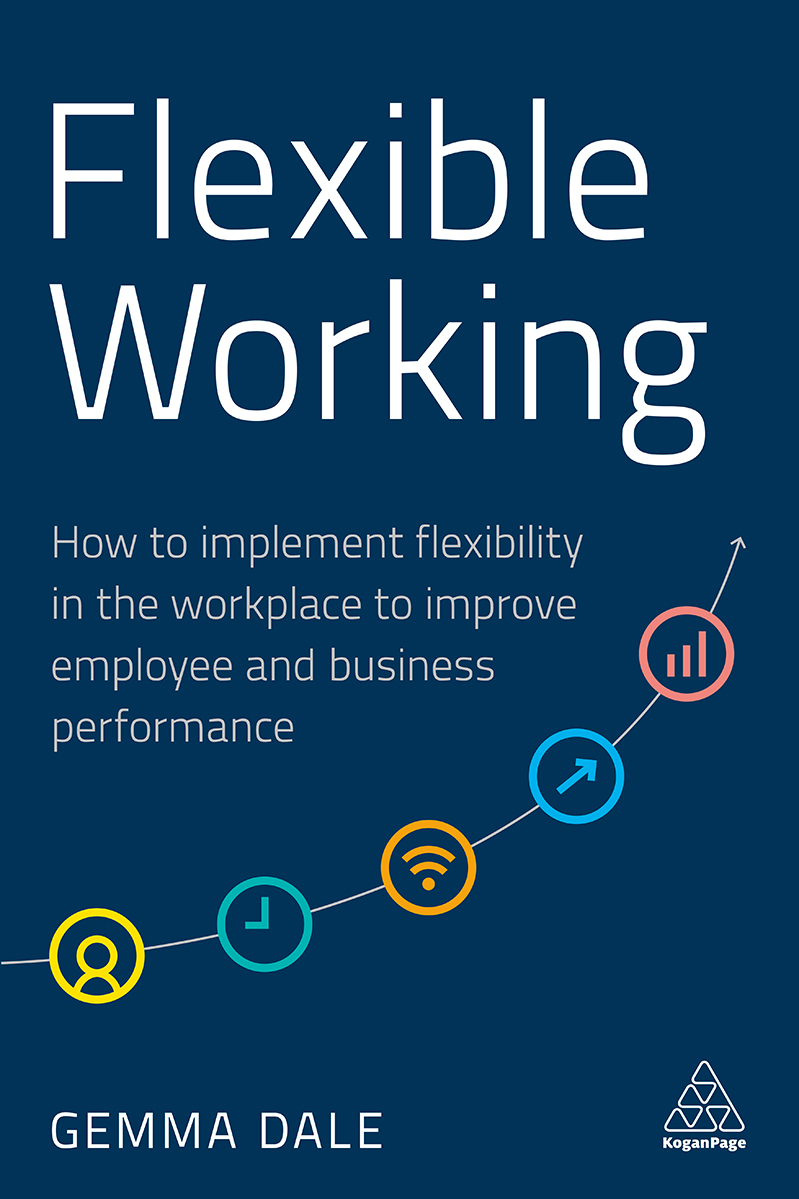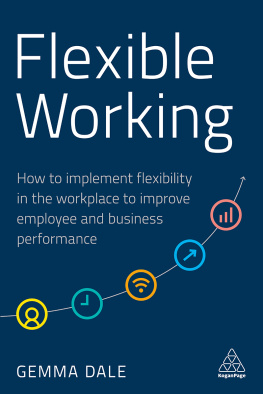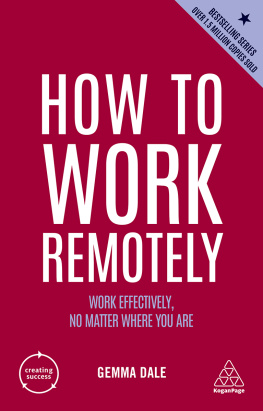Dale Gemma - Flexible Working
Here you can read online Dale Gemma - Flexible Working full text of the book (entire story) in english for free. Download pdf and epub, get meaning, cover and reviews about this ebook. year: 2021, publisher: Kogan Page, Limited, genre: Romance novel. Description of the work, (preface) as well as reviews are available. Best literature library LitArk.com created for fans of good reading and offers a wide selection of genres:
Romance novel
Science fiction
Adventure
Detective
Science
History
Home and family
Prose
Art
Politics
Computer
Non-fiction
Religion
Business
Children
Humor
Choose a favorite category and find really read worthwhile books. Enjoy immersion in the world of imagination, feel the emotions of the characters or learn something new for yourself, make an fascinating discovery.
- Book:Flexible Working
- Author:
- Publisher:Kogan Page, Limited
- Genre:
- Year:2021
- Rating:3 / 5
- Favourites:Add to favourites
- Your mark:
- 60
- 1
- 2
- 3
- 4
- 5
Flexible Working: summary, description and annotation
We offer to read an annotation, description, summary or preface (depends on what the author of the book "Flexible Working" wrote himself). If you haven't found the necessary information about the book — write in the comments, we will try to find it.
Flexible Working — read online for free the complete book (whole text) full work
Below is the text of the book, divided by pages. System saving the place of the last page read, allows you to conveniently read the book "Flexible Working" online for free, without having to search again every time where you left off. Put a bookmark, and you can go to the page where you finished reading at any time.
Font size:
Interval:
Bookmark:

An excellent how to do it book that helps employers think through their options for flexible working in the new world of work. This is a very well written and extremely timely book and will support the HR community in thinking through how we work in the future.
Professor Sir Cary Cooper, Alliance Manchester Business School, University of Manchester
From formulating a strategy to launching and embedding flexible working practices across the organization, this book is the perfect companion to this potentially daunting task. Part One of the book sets out the rich evidential basis for flexible working as a driver of organizational performance and its impact on the bottom line. Part Two provides a step-by-step approach to ensuring that a move towards flexible working is not only successful from day one but also sustainable in the longer term. Packed with case studies, practical examples and useful templates, this book is a must-read for forward-looking businesses of all sizes.
Karen Teago, CEO and Principal Solicitor, Your Employment Settlement Service.
An accessible and well-reasoned contribution to thinking about and understanding flexible work. It not only makes a clear case for the benefits of organizations taking a flexible approach to work, but also offers clear and easily implementable interventions to overcome some of the most commonly faced barriers. It does this while also calling out, with gusto, those areas where myth, bluster or lazy assumptions have dominated the debate.
David DSouza, Membership Director, CIPD
This book is a must-read for any HR practitioner or business leader who wants to create a more flexible future for their organization. As well as providing the evidence to build the business case, it delivers a complete and practical guide to every step that you need to take along the way. Gemma Dale provides us with compelling reasons to rethink how and where we work.
Tim Scott, People Director, Fletchers Solicitors
If you are an HR professional or a line manager, this comprehensive book will take you on a learning journey, giving you both an introductory blast into what flexible working means through to embedding it into your organizations strategy and culture. It uniquely does the horizon scanning for you as you consider the future and how flexible working can support other big workplace agendas such as wellbeing, attracting talent and inclusion. Myths are dispelled, barriers explored and toolkits included to help to create a flexible working culture and embed flexible working practices. Its a must read. Five stars from me!
Daphne Doody-Green, Head of CIPD Northern England
Punchy, comprehensive and thorough, this book covers everything you need to know about this vital subject. If youre still in any doubt that flexible working should be part of our present and future, youll be left with a clear sense that this is the right thing to do and be equipped with all the information, perspectives and tools needed to make it happen. You cant afford to be without this book.
Neil Usher, Chief Partnerships Officer, GoSpace AI, and author ofThe Elemental Workplace
How to implement flexibility in the workplace to improve employee and business performance
Gemma Dale

This book could not have been written without the constant support of my partner Tim. Many thanks are due to him for services to grammar and punctuation.
I am particularly indebted to the organizations and academics whose research, experiences and survey data is discussed throughout this book. Thank you for your insights, without which this book would not have been possible.
Thanks are also due to the team at Kogan Page for providing me with the opportunity to write about this subject.
Since the Industrial Revolution, a great deal of the work that many of us undertake has continued to be done in a very similar way and within a similar structure, both of which will be familiar to most employees today. For a significant proportion of the current workforce, our daily work involves travelling to a particular location where we will find others undertaking their own work for the same organization. The work itself typically takes place between Monday and Friday (although in the not-too-distant past working Saturday too was also commonplace) and broadly between the hours of 9am and 5pm, with just a few minor variations on this theme. When the particular work activities or working hours are completed, employees travel home again. In this model, work is both an activity that we undertake as well as a place to which we go.
Although in our 24/7 culture this description is not necessarily true of all organizations or job roles, it is a model that we know well, and it is the default way of working for many employees. There are some obvious reasons why work evolved in this way. Although today many of our industries are now service-driven and technology-filled, in the recent past employees needed to travel to a particular place in order to physically undertake their work (such as working on a production line in a manufacturing plant) or to communicate with other workers face to face. Simply, for many years, the default model of work was a necessity; there was no feasible alternative. This default model not only continues to dominate, but has also proved particularly resistant to change.
In many respects, these ways of working pertain to a previous generation and previous ideas of work. This is how our parents and grandparents worked, and they did so because the nature and organization of their work demanded it. These models have, however, in recent years come under increasing pressure as the very nature of jobs, as well as how and where work can be completed, have fundamentally changed. The ideas and approaches of previous decades, indeed centuries, no longer hold true. The traditional command and control manager, providing direct supervision and telling people what to do and when to do it, equally has less and less relevance in the current world of work. In todays economy, more and more of us undertake what is often termed knowledge work: work that requires people to think and process information for a living, applying their specialist experiences and learning. Knowledge workers therefore do not work in a factory or on a production line, and there is no need for them to behave, or lead, as if they do.
Whilst both the possibilities and technologies within the workplace have evolved, our approaches to how we work have not kept pace. Many organizations still work in the old ways, acting as if the old barriers to alternatives exist. We are, perhaps, so used to the Monday to Friday, location-based, default model of work, that it is difficult to see the potential of a new way. If we choose, however, to step back for just a moment and look at both work and organizational behaviour with fresh eyes, many of the ways in which we undertake and organize much of the work that we do make little sense today for a lot of employees, their managers and their places of work.
Consider this example. Although commuting distances and start times will vary, many of us leave our homes for our place of work in the morning, each of us doing so around a similar time the so-called rush hour. We get into our cars or onto buses, trams and trains, all of us again at the same time, for which, in terms of public transport at least, we pay a premium. For those who drive to work, we may find ourselves in heavy traffic or contending with expensive city-centre car-parking charges. These commutes create a carbon footprint, take time and add to workers stress levels. Many people use this commuting time to undertake even more work, adding to their working day by responding to emails on the train or making calls from the car. Upon arrival at our places of work we normally sit at the same desk, engage with the same people, send emails to and sit in meetings with them. We do much of our work by using tools and technology that could be used anywhere. At the end of the working day we return to our homes, undertaking our trying journeys in reverse. The question arises: if we invented work tomorrow, is this how we would choose to organize it? Is this really the most sensible way in which to work and earn a living, in the early 21st century?
Font size:
Interval:
Bookmark:
Similar books «Flexible Working»
Look at similar books to Flexible Working. We have selected literature similar in name and meaning in the hope of providing readers with more options to find new, interesting, not yet read works.
Discussion, reviews of the book Flexible Working and just readers' own opinions. Leave your comments, write what you think about the work, its meaning or the main characters. Specify what exactly you liked and what you didn't like, and why you think so.












